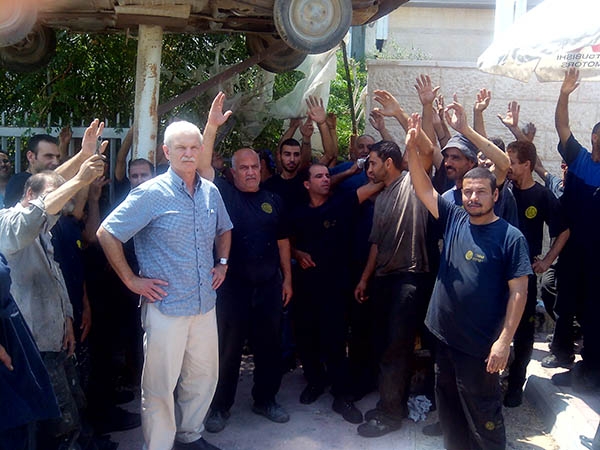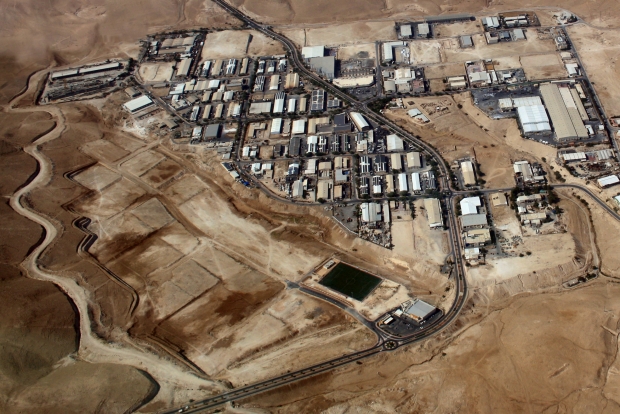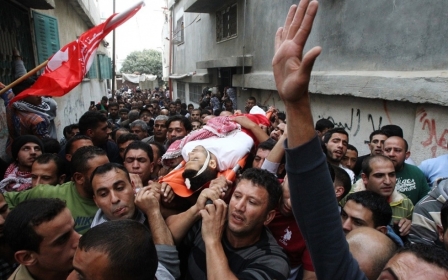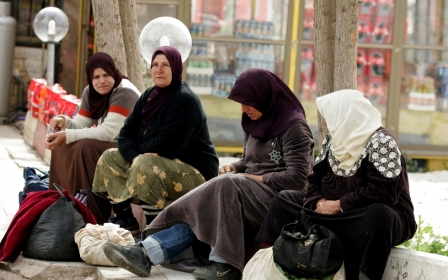Labour struggle in West Bank belies claims of harmony

Hatem Abu-Ziadeh, a 44-year old Palestinian car mechanic employed at the Mishor Adumim industrial zone near Jerusalem in the occupied West Bank, has been unable to work for six months.
In July, as leader of a workers committee in the Zarfaty car garage, he helped organise industrial action against his Israeli employers after they refused to recognise a union set up by the garage workers to challenge poor working conditions.
WAC-MAAN (Workers’ Advice Centre) is one of the first trade unions to operate in a West Bank industrial zone; manufacturing hubs set up in areas occupied and controlled by Israel and deemed illegal under international law. The union is jointly led by Israelis and Palestinians and represents on behalf of Palestinians working for Israeli companies in the West Bank.
In July, Abu-Ziadeh, a stocky man with a round face and a faint moustache, delivered a letter to his employer, an Israeli named Morris Zarfaty, announcing a planned strike by the workers in protest at low wages, the lack of proper wage slips, vacation, sickness pay, a pension fund and overtime pay.
A few days after the strike Abu-Ziadeh found that his work-permit – which he requires to travel from his home in the town of Birzeit to work in the industrial zone – had been cancelled by Israeli authorities. The managers of the garage had told the security services that Abu-Ziadeh had "sabotaged a military vehicle" and was a potential “security risk”.
Both Abu-Ziadeh and the labour union say that the complaint was a lie intended to undermine the workers and their newly-formed union.
“I was targeted because I am a member of the workers’ committee in the union,” Abu-Ziadeh, who had worked at the garage for 17 years, told Middle East Eye. “I speak on behalf of the union within the garage. Because of this, they levelled a politically-motivated accusation against me, so that I won’t be around at the garage to protect the workers.”
4 months later, in later November, after a lobbying campaign by the union and an appeal to Israel’s high court of justice, the attorney general announced that Abu-Ziadeh’s permit would be reinstated. However, since permits are only renewed every four months, it could be some time before he is able to return to work.
“We suffered a lot after my work licence was revoked,” he said. “There are six children in my family, plus me and my wife: eight altogether. While I couldn’t work, we were living on a monthly pension of 2,000 shekels [$500]. How could we live on that? It was a very, very hard time."
Abu-Ziadeh will still need his employer to reapply for his permit.
A video produced by WAC-MAAN highlighting the campaign for Abu Ziadeh's reinstatement.
Abu-Ziadeh’s ongoing struggle may yet prove crucial in challenging exploitative conditions faced by the other 7,500 Palestinians working in the Mishor Adumim industrial zone.
Assaf Adiv, the 62-year old Israeli director of the WAC-MAAN trade union, told MEE that the decision of the Israeli authorities to return Abu Ziadeh’s permit was a breakthrough that could inspire other workers to challenge their employers for better rights.
“Dismissing the leader of the workers with fake accusations was meant to serve as a lesson to all workers in the factory: ‘don’t demand too much because you will be just dismissed like this,’ Adiv said. The employer can do what they want.”
In light of this, the decision to dismiss the case against Abu Ziadeh means it “would not be easy” for future employers to successfully “falsify accusations” against their workers, he said.
A ruling by the Israeli High Court of Justice in October 2007 stated that Palestinian workers employed by Israelis in Israeli settlements were entitled to all the employment benefits – such as the minimum wage - that their Jewish counterparts receive, a decision upheld by later labour court rulings. This landmark decision prompted a spate of organising by Palestinians workers in the West Bank, particularly in the Mishor Adumim industrial zone, a move described by Adiv as “something exceptional and something new.”
As an Israeli union, WAC-MAAN can organise in the Israeli settlements where Palestinian unions are prohibited. Israel's largest trade union federation, Histadrut, does not allow Palestinians in the occupied territories to become members, even though it allows Jewish settlers to join. Its unwillingness has allowed smaller, independent organisations like WAC-MAAN to fill the vacuum.
For Adiv, political support for the Palestinians has been a defining factor in his organisation.
“We have a position that is that is very positive towards the Palestinian struggle and opposed to the Israeli occupation and racism,” he said. “We see it as a contribution to the struggle, not just for the rights of the Palestinians, but as a net contribution to maintaining or developing an active, vibrant civil society in Palestine.”
“These workers become people who know how to organise, how to help each other, know how to help the weak person in your group.
Abu Ziadeh also lauded the union's achievements, originally turning to them after being rebuffed by Palestinian unions both unwilling and unable to operate in his workplace.
“Only WAC-MAAN took a strong stance by our side,” he said. “They helped me – they gave me about 5,000 shekels to support me while I couldn’t work. That money came directly from the union. They launched a media campaign for me.”
“The union does not differentiate between Palestinians and Israelis,” he added. “It struggles for workers’ rights, those of Palestinians and of Israelis.”
But in spite of WAC-MAAN’s successes, recent violence in the West Bank and East Jerusalem has precipitated the revocation of many other Palestinian workers’ permits.
"Israel, citing security reasons, has refused to renew more than 600 permits for Palestinian workers since tension flared three months ago," a source with the Palestinian Ministry of Civil Affairs, who requested anonymity, told the Anadolu Agency on Tuesday.
The source said that Israel had claimed, in an attempt to defuse tensions in the occupied territories following the bombardment of Gaza in the summer, that it would grant more work permits to Palestinians from the West Bank and Gaza.
"But alas, this wasn't reflected on the ground. Conversely, the number of workers whose permit renewals have been rejected is on the rise," the source added.
Though the revocations were officially mandated for security reasons, Adiv described the tactic as an effective way for Israeli employers to circumvent laws prohibiting the firing of trade union organisers.
“It means if a worker is too strong in their demands, if they are behaving in a way they are not satisfied with or talking too much to others, they can just secretly go to the military authorities and say this workers is suspicious or threatening or whatever and the permit is taken from the worker and the workers loses his job,” he said.
In a report from 2010, the Israeli NGO Kav LaOved (Workers’ Hot Line) described the withdrawal of permits as a primary tool in undercutting demands by Palestinian workers for better pay and conditions
“The fear of losing the work permit is often greater than the fear of losing one’s job,” wrote Salwa Alenet, head of the NGO’s Palestine desk. “Without the permit, the worker’s chances of employment in the settlements are close to zero.”
“Israeli employers do not hesitate to use this as a bargaining card in order to pressure their workers to rescind suits from labor courts or desist demanding a raise.”
‘Neoliberal vision’
The Mishor Adumim industrial zone was established in the 80's and since 1998 has been managed by Ma'aleh Adumim Economic Development Co. Ltd.
Adam Hanieh, author of Lineages of Revolt: Issues of Contemporary Capitalism in the Middle East, described the industrial zones as a key part of the “neoliberal vision” for the restructure of the West Bank economy.
“Much like experiences elsewhere around the globe, industrial zones in the Palestinian context - whether Israeli or Palestinian owned - seek to exploit cheap labour and maximise employer profits” he told MEE.
“They typically involve offering incentives to investors that include low tax regimes, cheap or subsidised land, and loosely regulated labour, environmental and other laws. In the West Bank, they are closely linked to Israeli settlements and the confiscation of Palestinian land. The upshot is a deepening entrenchment of Israeli occupation, facilitated through neoliberal development models."
The unwillingness of inspectors to travel to Area C in the West Bank - where Mishor Adumim is located - has meant that there has been little enforcement of labour rights in the settlement and low pay and exploitation have been rife.
In November, the global Boycott, Divestment and Sanctions (BDS) movement claimed a victory after a factory owned by the SodaStream companies closed its operations in the industrial zone. Though the company provided work to 500 Palestinians, the Israeli NGO Kav LaOved (Workers’ Hot Line) reported numerous cases of Palestinians being exploited, with one worker describing his conditions as feeling like he was “enslaved.”
In spite of the controversy, the Mishor Adumim industrial zone has been hailed by commentators as an example of the possibility of co-existence and cooperation between Jews and Arab. In a promotional video, Daniel Birnbaum, Sodastream's CEO, praised Mishor Adumim as a “fantastic sanctuary of co-existence and an example of peace in a region that is so troubled and so needs hope.”
In early December a Palestinian worker went on a rampage through a shopping mall in Mishor Adumim, injuring a number of Israelis with a knife. In the aftermath of the attack, Rami Levy, owner of the supermarket chain that owned the store lambasted the attack as an attempt to undermine the peaceful harmony which Arab and Jews worked in at the site.
But Hanieh highlighted that the inequality between the Israeli employer and Palestinian worker only stands to enforce the latter’s subservience to the former, particularly in the context of land colonisation and dispossession
“In this context, any assertion that this represents 'cooperation and coexistence' really only serves to hide exploitation and occupation,” he said.
“A strong labour movement not only helps to win better social conditions, it is also integral to building political alternatives - an essential and long-overdue need in the current juncture.”
"It's the same fight"
Abu Ziadeh’s case against his employer is still being deliberated upon in a labour court.
“Still the employer insists that he is a threat to security.” said Adiv. “He came to the labour court with a document from a law level officer in the army that sends the Garage the vehicles said that, in effect, they do not want Hatem to work on their cars.”
“We are waiting for the decision of the Jerusalem Labour Court that is due in the coming weeks and we believe it will recognize WAC-MAAN as the representative union in the garage and order the bosses to reinstate Hatem to work. So the prospects are the in early January we are going to have to fight with the bosses to implement this Labour Court decision."
Adiv told MEE that the successes of WAC-MAAN and other trade unions in Israel/Palestine provide an “alternative model" to what appeared to the outside world to be an increasingly antagonised and irreconcilable situation.
“We say, look, its possible to work together, its possible to be confident in each other, to fight together - because it’s the same fight,” he said, comparing the struggle in the West Bank to the struggles facing the Arab Spring protestors in 2011.
“Its in the spirit of the demands of the Egyptian workers and youth, Syrians, Tunisians, everyone wants democracy, freedom and social justice.”
Though Hatem Abu Ziadeh is still without work, appeals to the labour courts and industrial action by the workers in Zarfaty, - who are determined to have him return to chairing the committee - have left him hopeful of eventually being able to return.
“I hope I will be able to return to work in the settlement – after I get permission from the boss of the garage,” said Abu Ziadeh.
Though the union continues to be active in Zarfaty garage, he said more needed to be done to raise the profile of workers organising in the West Bank.
“I want to see international unions taking a strong stance beside WAC-MAAN, so it can protect Palestinian workers and support them,” he said.
“The union worked every day to restore me to work. They were standing with me the whole time.”
Middle East Eye propose une couverture et une analyse indépendantes et incomparables du Moyen-Orient, de l’Afrique du Nord et d’autres régions du monde. Pour en savoir plus sur la reprise de ce contenu et les frais qui s’appliquent, veuillez remplir ce formulaire [en anglais]. Pour en savoir plus sur MEE, cliquez ici [en anglais].





